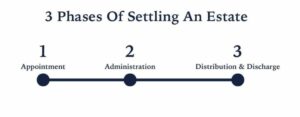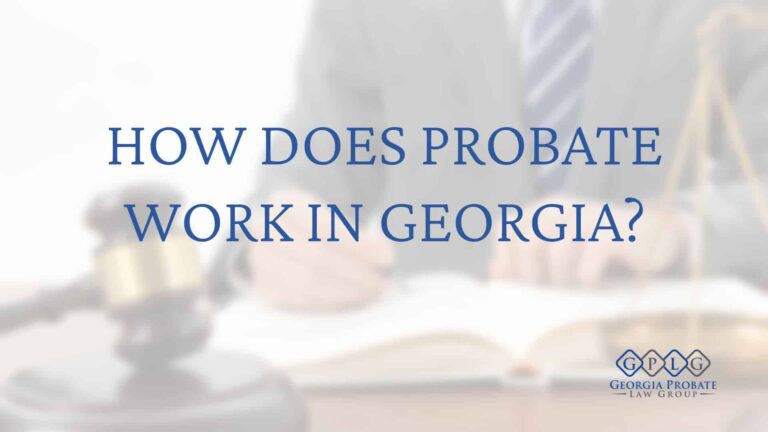It is common for heirs or beneficiaries to worry when the personal representative takes too long to distribute their inheritance. This is usually the case when families are not familiar with the intricacies of the probate process. And they keep wondering how long does the probate process take.
Knowing how the probate timeline works will help you understand what might be causing a delay.
Probate laws differ from state to state, and in this article, we will cover Georgia’s probate laws, timeline, and process.
When Is Probate Required?
Probate exists to ensure that a loved one’s estate assets are distributed fairly to their heirs or beneficiaries and that their liabilities are settled.
Skipping probate can make it challenging to determine who gets what from the estate or, worse, leave you legally responsible for your decisions.
Under Georgia Law, an estate does not have to be probated. However, if you have the will, you must present the original document to the appropriate Probate Court.
Completing the probate process can help you safeguard your loved one’s assets. Without it, issues may arise with titled properties such as real estate, vehicles, and business interests. There are also cases when financial institutions freeze accounts unless the court appoints an executor or administrator.
Although probate may seem like the more daunting option, it can ultimately save you from potential headaches down the road.
How Long Does It Take to Settle an Estate with a Will?
It depends. Under Georgia law, you must file the original will in the Probate Court. If you don’t, then someone else may attempt to open the estate as if there is no will, which may not reflect the deceased’s wishes. Executors who fail to file the will could also face financial and legal consequences.
Probate also literally means “to prove the will”.
This legal process exists to prevent fraud, including fake wills. Without it, the likelihood of such activities would increase significantly.
How Long Does Probate Take Without Will?
If your loved one passed away without a will, their estate should still be opened with the Probate Court. The assets are generally distributed according to the state’s intestacy laws. These laws prioritize the deceased’s family members based on their relationship with the deceased.
- If the deceased had a surviving spouse and no children, the spouse inherits all the assets.
- If the deceased had a surviving spouse and children, the spouse is entitled to up to one-third of the estate. The remaining two-thirds will be divided equally among the children.
- If the deceased had a child that had passed away and that child had children, then those children
may be entitled to a portion of the estate. - Without surviving spouses or children, the deceased’s assets will go to their parents if they are still living.
- If neither of the deceased’s parents lives, the estate will be distributed among the deceased’s siblings.
- If there are no surviving siblings, the estate could be divided among the deceased’s nieces and nephews.
- Finally, if none of these relatives are alive, the assets will be distributed to the next of kin.
Nobody can settle liabilities and transfer or sell estate property unless probate is established. If you don’t open probate, the deceased’s real property may also remain in their name, which could cause issues for their loved ones in the long run.
Is There Any Way to Skip Probate in Georgia?
Typically, no, but if all assets were non-probate, it may not be necessary as they have a predetermined beneficiary or joint owner. When the owner dies, the financial institution distributes these assets to the designated recipient by default.
Some examples of non-probate assets are:
- Certificates of Deposit.
- Life insurance policy with a named beneficiary.
- IRA, 401K with a designated beneficiary, POD, or TOD on the account.
- Bank accounts with a Transfer on Death (TOD) or Payable on Death (POD) listed.
- Land or real estate titled with other parties as Joint Tenants with Rights of Survivorship (JTWROS) or real estate with joint ownership.
How Long Does an Executor Have to Settle an Estate in Georgia? How Long Do You Have to File Probate After Death?
Without disputes, probate generally takes anywhere between 12 to 18 months, depending on the estate’s size and complexity.
Disagreements between the personal representative and beneficiaries or heirs can significantly extend this timeframe.
The Probate Process Timeline
In Georgia, the probate process can be broken down into the following three phases, each with its own timeline:
Appointment (6 weeks to 3 months)
During this stage, the court appoints a personal representative to manage the estate. Heirs and beneficiaries will have a chance to object to the nominated representative. Several factors can affect how long the appointment phase takes, like how promptly family members submit the required paperwork and the estate’s location. Various courts may also have different processing speeds, which can impact the timeline.
Administration (minimum of 4 months)
Most of the work is done here, such as identifying and notifying creditors, gathering assets, finding the heirs and beneficiaries, and satisfying creditors.
Distribution and discharge (6 weeks to 3 months)
The personal representative distributes the remaining assets to heirs and beneficiaries and closes the estate during this stage.
Any disputes among beneficiaries and the estate’s complexity can impact the probate, potentially adding extra steps to the procedure.
Does A Dispute Make Probate Take Longer?
Yes, when a dispute comes up in a probate case in Georgia, it can take longer to settle the estate.
So, how long does probate take if disputes arise?
Depending on many factors, probate disputes may add months or years to the typical timeline. These factors can include:
- The court calendar and when the court can hear the case
- Whether the parties are open to a settlement
- The number of disputes that come up in the estate
Parties’ willingness to settle disagreements can help expedite the process.
How Do Estate Size and Complexity Affect Probate Time?
The size and complexity of an estate play a critical role in determining how long the probate process takes. Generally, smaller estates without disputes and complications are settled more quickly, while larger estates with beneficiary disputes may take years to resolve.
If you want to expedite the probate, we recommend working with an experienced lawyer who can help streamline the process and minimize the time it takes to settle the estate.
Are There Any Faster Options for Probate in Georgia?
If you want to speed up the probate process in Georgia, there is an option, but the requirements are very strict.
You can petition for an order declaring no administration to inform the court that you intend to bypass probate. This petition can simplify the distribution of a deceased person’s assets with less legal involvement and cost. However, this option is usually limited to tiny estates.
One significant drawback is that this option cannot be used if the decedent left a will.
If you are eligible to file this petition, each party must agree to a written distribution plan and certify that no estate debts remain.
Can the Probate Court Impact the Length of the Probate Process?
The Probate Court’s involvement in the process can affect the overall timeline.
The Probate Court Judge decides on the best course of action, particularly in situations where there are conflicting views among parties. In simpler terms, the court brings order to the chaos.
The Timeline for Satisfying Creditor Claims
As part of the administration phase, the personal representative must settle with creditors. To do this, the personal representative must run a creditor/debtor ad in the local newspaper for four weeks. This ad notifies creditors that they have three months to file a claim against the estate.
During this three-month period, the estate remains open to allow any creditors to come forward and file their claims. Creditor claims may be filed with the Executor or Administrator directly, or they may file a claim through the Probate Court.
If you dispute a creditor’s claim, you may have the opportunity to present your disagreement to the court before a final decision is made. Disputes like this can further prolong the probate.
The Personal Representative’s Role in Speeding Up the Georgia Probate
If you are the personal representative, there are steps you can take to make the process as quick and efficient as possible. Here are some tips to help speed up probate:
- Start probate as soon as possible.
- Stay organized and keep track of deadlines.
- Communicate proactively with beneficiaries and creditors so that everyone is on the same page and there are no misunderstandings or delays.
- Ensure all necessary documents and information are promptly gathered and submitted to the probate court.
- Consider hiring an experienced probate attorney to assist with the legal process.
- Keep accurate records of the estate’s assets.
Unforeseen circumstances may come up and cause delays. In these situations, it’s best to remain calm and avoid reacting emotionally, as it won’t help resolve the issue.
What Do You Do If You Feel Like the Executor Or Administrator Is Taking Too Long to Complete Probate?
If you believe the probate is taking longer than it should, here are some steps you can take to help get the estate moving again:
- Communicate with the executor or administrator to find out what is causing the delay.
- Attempt to resolve misunderstandings if there are any.
- File a petition to remove the executor along with other sanctions and request to appoint someone else.
- Demand for accounting or distribution.
These situations are complicated, and trying to handle them alone is not recommended.
When Does Probate End in Georgia?
Once the probate process is complete, the personal representative will file a petition for discharge with the probate court. The court will then review the petition and, if everything is in order, issue an order discharging the personal representative and officially closing the estate.
If you are an heir or beneficiary, you should receive a notice of the petition for discharge and have an opportunity to object to it before the court makes a final decision. Once the estate is closed, you should receive your distribution from the estate according to the terms of the will or intestacy law.
Can a Probate Lawyer Help Speed Up Probate?
With a probate attorney’s assistance, you can expect the process to move more quickly. Probate lawyers have experience handling probate cases so that they can navigate the legal process more efficiently.
A probate attorney can also help you understand your rights and responsibilities and help you make informed decisions.
If you’re dealing with a complicated probate process, working with a skilled probate attorney can be a valuable investment of your time and resources.
Your Next Step
While it’s difficult to determine the exact length of the probate process, seeking the help of an experienced attorney can help you avoid potential issues that may further delay the already lengthy process. A skilled attorney can provide invaluable guidance and support, ultimately saving you from unnecessary stress and wasted time.
If you have any probate-related concerns or questions, we encourage you to reach out to our office at (770) 796-4582. Our team is here to help you navigate the probate process and ensure your loved one’s estate is handled carefully and efficiently.
More information
Disclaimer These websites have not been reviewed by Georgia Probate Law Group and are not endorsed or even recommended by Georgia Probate Law Group. These websites are additional resources that you can use to further your general education on this topic.
Disclaimer: The information above is provided for general information only and should not be considered legal advice. Our probate attorneys provide legal advice to our clients after talking about the specific circumstances of the client’s situation. Our law firm cannot give you legal advice unless we understand your situation by talking with you. Please contact our law office to receive specific information about your situation.





























